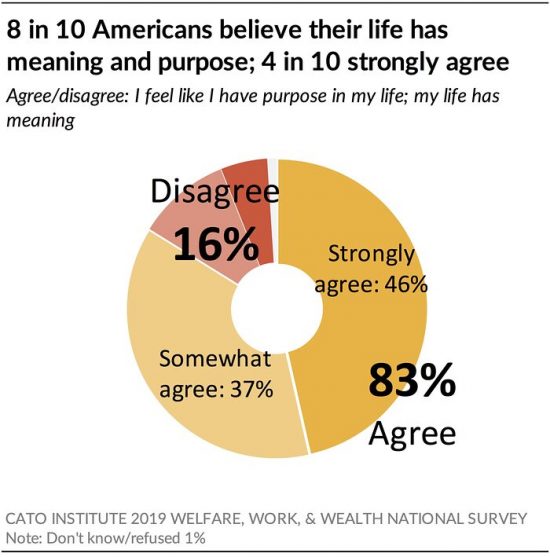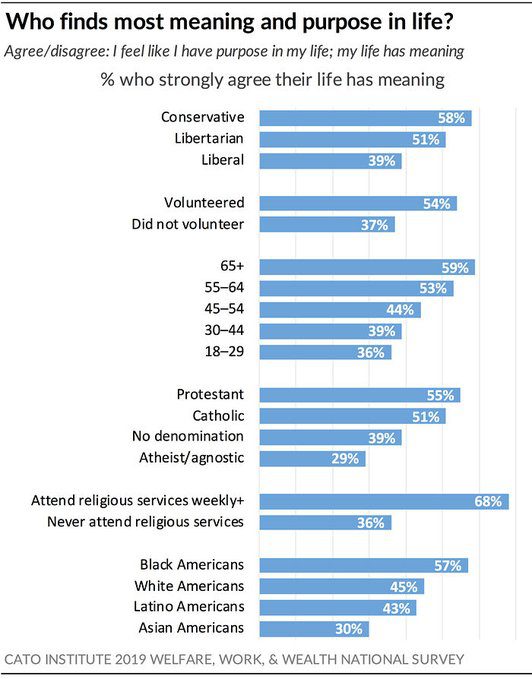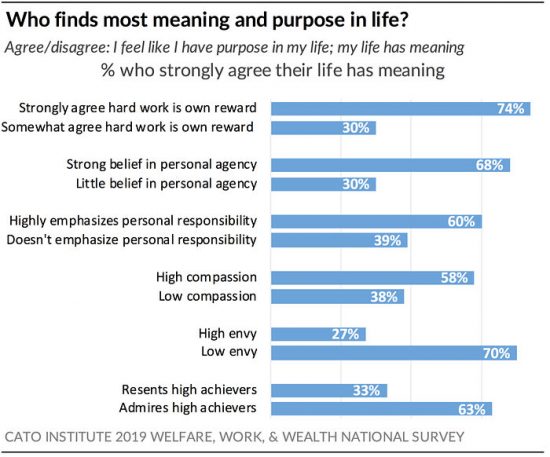Life Without Meaning

A new CATO Institute survey looks into the views of Americans on economic questions. It contains a section on the kind of people who say they find meaning in their lives. These graphs tell the story:



Seems like being an atheist left-wing narcissist is not good for finding meaning in life.
It’s interesting to see that black Americans are by far and away more likely than any other ethnic group to strongly believe that their lives have meaning. This, despite the fact that they experience the most poverty, on average, of all the groups. Why is this, do you think? Religion? Family? And why do so few Latinos feel this way?
It strikes me as worrying that only a minority of Americans strongly believe that their lives have meaning and purpose. I suppose I’m not surprised, but it is worrying nonetheless. On the age demographic question, you might say that the young haven’t lived long enough to discover a strong sense of meaning and purpose. They are still finding their way. I wonder, though, if today’s young will ever find it in significant numbers, given that broader society denies that there is ultimate meaning and purpose in life. Saying that meaning and purpose is to be found in satisfying your individual desires is the same thing as saying it doesn’t exist at all. In The Benedict Option, I quoted this 2011 finding from sociologist Christian Smith, about Americans aged 18 to 23:
An astonishing 61 percent of the emerging adults had no moral problem at all with materialism and consumerism. An added 30 percent expressed some qualms but figured it was not worth worrying about. In this view, say Smith and his team, “all that society is, apparently, is a collection of autonomous individuals out to enjoy life.”
Human beings cannot long live without meaning. As Douglas Murray writes in the introduction to his new book, The Madness of Crowds: Gender, Race, and Identity, the “great crowd derangement” of our time — he’s talking mostly about identity politics — is coming about because of a shared lack of meaning:
Even the origin of this condition [the “great crowd derangement”] is rarely acknowledged. This is the simple fact that we have been living through a period of more than a quarter of a century in which all our grand narratives have collapsed. One by one the narratives we had were refuted, became unpopular to defend or impossible to sustain. The explanations for our existence that used to be provided by religion went first, falling away from the nineteenth century onwards. The over the last century the secular hopes held out by all political ideologies began to follow in religion’s wake. In the latter part of the twentieth century we entered the postmodern era. An era which defined itself, and was defined, by its suspicion towards all grand narratives. However, as all schoolchildren learn, nature abhors a vacuum, and into the postmodern vacuum new ideas began to creep, with the intention of providing explanations and meanings of their own.
It was inevitable that some pitch would be made for the deserted ground. People in wealthy Western democracies today could not simply remain the first people in recorded history to have absolutely no explanation for what we are doing here, and no story to give life purpose. Whatever else they lacked, the grand narratives of the past at least gave life meaning. The question of what exactly we are meant to do now — other than get rich where we can and have whatever fun is on offer — was going to have to be answered by something.
That “something” is identity politics, which seek “to embed a new metaphysics into our societies: a new religion, if you will.”
We are now at the beginning of the post-Christian Wars of Religion. This will become clearer very soon, I’m afraid, especially as the older generations, whose sense of meaning was fixed by the old narratives, die off, and leave the field to those who were raised in the ruins of what was once a coherent and cohesive civilization.
Subscribe for as little as $5/mo to start commenting on Rod’s blog.